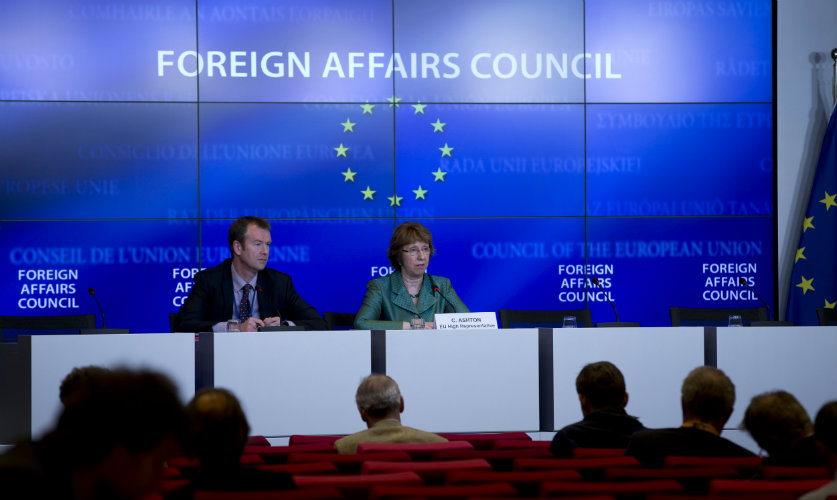
15. April 2014.
EU Foreign Affairs Council conclusions on Bosnia and Herzegovina
EU Foreign Affairs Council meeting Luxembourg, 14 April 2014 The Council adopted the following conclusions: The Council reaffirms its unequivocal commitment to the territorial integrity of Bosnia and ...
EU Foreign Affairs Council meeting
Luxembourg, 14 April 2014
The Council adopted the following conclusions:
- The Council reaffirms its unequivocal commitment to the territorial integrity of Bosnia and Herzegovina as a sovereign and united country. The Council also reiterates its unequivocal commitment to Bosnia and Herzegovina’s EU perspective. In this regard, it condemns as unacceptable secessionist and divisive rhetoric and ideas.
- In line with its conclusions of December 2013, the Council recalls its serious concern that the EU integration process in Bosnia and Herzegovina (BiH) has stalled due to the lack of political will on the part of the BiH politicians and the continued use of divisive rhetoric. As other countries of the region make progress, Bosnia and Herzegovina is lagging behind.
- The Council heard the public protests and calls by BiH citizens to improve the social and economic situation in the country. All BiH citizens, including the younger generation, need to be given new opportunities. It strongly urges the BiH institutions and elected leaders to reach out to the people, engage with civil society and provide responsible and immediate answers to their legitimate concerns. The Council emphasizes that it is the collective responsibility of all BiH political leaders. Ahead of the general elections in October 2014, more needs to be done, not less.
- The Council welcomes the visits of the HR/VP to Bosnia and Herzegovina on 12 March 2014 and of Commissioner Füle on 17 of February 2014 and supports the continuous EU high level engagement in BiH. In line with previous Council conclusions, it reaffirms that the key requirements and criteria for BiH progress towards the EU need to be fully met. The Council supports the broadening of the EU agenda and engagement towards the country. In the short term, the Council urges the BiH institutions and leadership to focus as a matter of immediate priority on the following areas: to reach out actively to civil society and youth and take into account the needs of the citizens; to focus on socio-economic issues, in particular to tackle the very high unemployment, improve the co-ordination on economic and fiscal policies, and create a better environment for business; and to translate the legitimate concerns of the BiH people into legislative and fully implemented initiatives, including strengthening the rule of law, anticorruption and financial accountability measures, and protecting human rights.
- The Council underlines the EU’s readiness to support these immediate efforts now. It welcomes Commission initiatives to improve economic governance and strengthen competitiveness as well as stimulate economic growth. As an immediate action, it supports the launch on the ground of a “Compact for Growth”, aimed at assisting the BiH institutions in identifying concrete socio-economic structural reforms in order to reinvigorate the economy and spur the creation of jobs in the short to mid-term. It welcomes and supports the central role of the EUSR/HoD in assisting BiH in these efforts, which need to be conducted in close coordination with our key international partners, in particular international financial institutions to ensure complementarity, efficient allocation of resources and building synergies. The Council also supports broadening the Structured Dialogue on Justice to other rule of law issues, and in particular to anticorruption issues. It also underlines the need to accelerate the implementation of previously agreed EU-funded projects through IPA 2007-2013 and welcomes the establishment of a joint EU-BiH working group to that effect. The establishment of an efficient coordination mechanism on EU matters is crucial both for IPA and implementation of the Interim Agreement. The Council regrets that the inability of the Bosnian authorities to meet this EU requirement has already led to a loss of IPA funds. The Council expresses its concern that the last five subcommittees under this agreement could not take place so far due to BiH internal disagreements and urges the BiH Council of Ministers to agree on a way forward. The Council calls on BiH to constructively engage on the adaptation of the Interim Agreement/Stabilisation and Association Agreement, on the basis of traditional trade. The Council expects the BiH authorities to engage constructively in these initiatives.
- Beyond these areas of immediate attention, the Council calls on the BiH leadership to engage as soon as possible after the October elections on a broader set of issues in order to address the challenges the country continues to face as it progresses towards the EU. In particular, it remains crucial that the BiH leaders undertake reforms aimed at improving the efficiency and functionality of BiH institutions at all levels. Implementation of the Sejdic- Finci judgment of the European Court of Human Rights also remains to be addressed. The Council reaffirms its determination to actively and intensively engage in support of this process, in close coordination and cooperation with its main international partners.
